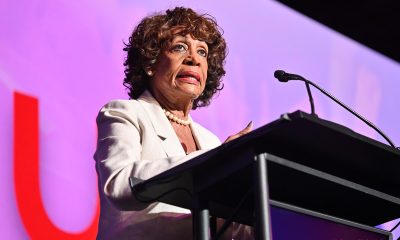California
Newsom to Californians: “Be Hyper-Vigilant” Storms inbound still
Stay informed by signing up for emergency alerts including warnings and evacuation notices. Go to CalAlerts.org to sign up
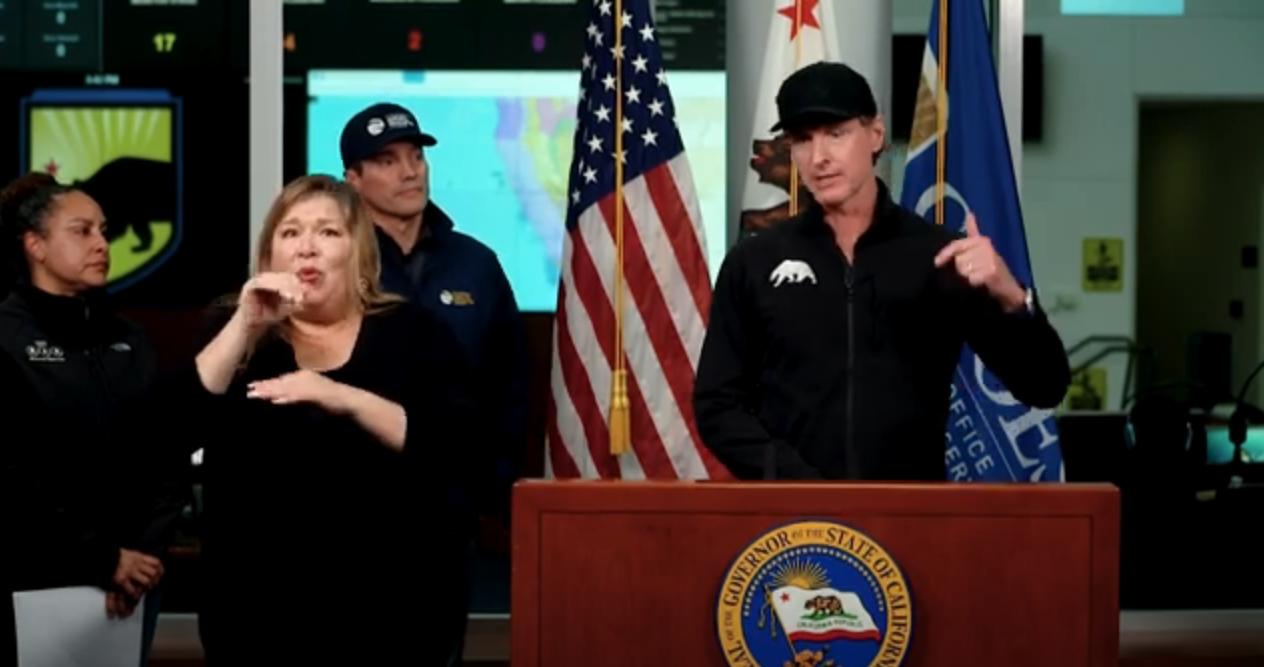
SACRAMENTO – As California enters the third week of severe winter storms, Governor Gavin Newsom is urging people to keep their guard up as strong winds and heavy rains continue to threaten communities across the state.
Last night, President Biden approved Governor Newsom’s request for a federal emergency declaration, activating the full weight of the federal government to support California’s storm response and recovery efforts. The Federal Emergency Management Agency (FEMA) is making federal disaster assistance available to supplement local and state resources, including funding, equipment and personnel.
Earlier today, Governor Newsom was briefed by state emergency officials on the latest conditions and response efforts, and the Governor continues to actively monitor storm impacts.
Also today, the California Governor’s Office of Emergency Services (OES) brought together more than 400 community-based organizations throughout the state in a first-of-its-kind effort to mobilize resources with a special emphasis on delivering help to vulnerable communities – unsheltered individuals, those with disabilities and older Californians.
As of Monday afternoon, winter storms have claimed the lives of 14 Californians – more lives than wildfires in the past two years combined.
“Our message to Californians is simple: be hyper-vigilant,” said Governor Newsom. “There are still several days of severe winter weather ahead and we need all Californians to be alert and heed the advice of emergency officials. Thanks to the President signing off on our request for emergency declaration, we are mobilizing all available resources at every level of government to protect lives and limit storm damage. Today marks five years since the deadly Montecito mudslides that claimed 23 lives – as Montecito faces evacuations today, it’s a solemn reminder of how quickly conditions can change.”
On Sunday, the Governor announced $202 million in new investments for long-term flood prevention proposed in the upcoming state budget. Also yesterday, Governor Newsom visited two sites along Deer Creek in Sacramento County to highlight the state’s work to repair damage from earlier storms and prepare for incoming severe weather.
The state is working to support the most vulnerable Californians with 11 shelters statewide along with an additional 20 shelters that are prestaged and on standby. Temporary shelter, food and additional resources are available at these sites and all are welcome. No ID is required.
Weather Forecast
Heavy rainfall is forecasted throughout the state Tuesday and northern California on Wednesday, increasing the potential for flooding given saturated soils from the previous two weeks of precipitation. According to the National Weather Service, rainfall levels are 400-600% above average across California.

Precipitation map showing the atmospheric rivers hitting California since Jan. 6.
Emergency Alerts
Californians are reminded to dial 2-1-1 or 3-1-1 to get help or ask questions. If you have a critical emergency, call 911.
Staying informed by signing up for emergency alerts including warnings and evacuation notices. Go to CalAlerts.org to sign up to receive alerts from your county officials.
Download the Caltrans QuickMap app to receive real-time notifications for road closures, emergencies, and other traffic updates. You can download the app here.
You can also view real-time information on anticipated river floodings here.
Watch: State Officials to Provide Update on Winter Storm Response From 1-8-23:
AIDS and HIV
Congresswoman Maxine Waters introduces new resolution for National Black HIV/AIDS Awareness Day
H.Res.1039 supports more funding, resources and awareness for Black American communities, who are disproportionately impacted by HIV/AIDS.

Today is National Black HIV/AIDS Awareness Day. Advocates established this day of awareness on Feb. 7, 1999, and nearly 30 years later, Black communities in the U.S. continue to be disproportionately impacted by HIV.
On Wednesday, California Congresswoman Maxine Waters introduced H.Res.1039, a resolution that supports the goals of National Black HIV/AIDS Awareness Day and calls for a collective commitment to address disparities Black people with HIV face. Waters represents the state’s 43rd congressional district, a majority Black and Brown population comprising South L.A. cities like Hawthorne, Gardena, and Inglewood.
In the resolution, Waters urges state and local government officials, as well as their public health agencies, to acknowledge the importance of this awareness day and encourage their constituents to get tested for HIV. The resolution also requests that the Secretary of Health and Human Services prioritize distributing grant funding to minority-led, HIV organizations and community-based approaches to fighting HIV stigma, LGBTQ+ discrimination, and racism.
In 2023, young Black men accounted for 47% of new HIV diagnoses among youth, while young white men made up 3% of these diagnoses, according to a new Williams Institute report. Black women also have the highest HIV diagnosis rate among women, and Black community members overall represent 38% of new HIV diagnoses and 39% of people living with HIV in the U.S., despite being only 12% of the national population.
Beyond the disproportionate rates of infection and diagnosis amongst Black Americans, these communities also face greater difficulties in accessing the medical care needed to prevent and treat HIV. In the same year, white Americans were 7 times more likely to access Pre-exposure Prophylaxis (PrEP) compared to Black Americans, a data point that affirms racial and healthcare inequities Black people continue to face in the U.S.
“[This] is a day to commemorate the impact of HIV/AIDS on Black Americans and encourage continued efforts to reduce the incidence of HIV, eliminate health disparities, improve access to care and treatment, and show support for all those who are living with HIV/AIDS,” said Congresswoman Waters, in a press release.
Waters has been an advocate for people impacted by HIV/AIDS since the peak of the crisis in the 1980’s. In 1998, she worked to establish the Minority AIDS Initiative, which expanded national prevention and treatment efforts in support of minority communities, who remain disproportionately impacted by HIV. In 2025, Waters introduced the “HIV Prevention Now Act” as well as the “PrEP and PEP are Prevention Act,” to increase prevention efforts and reduce health insurance barriers to access preventative resources, respectively.
H.Res.1039 is the latest addition to the congresswoman’s efforts to raise awareness for Black and other minority communities impacted by HIV/AIDS, and to fund and support on-the-ground efforts that prioritize their care and wellbeing.
The resolution is endorsed by various LGBTQ+ organizations mobilizing for communities impacted by HIV, including AMAAD Institute (Arming Minorities Against Addiction and Disease), LA Pride, AIDS Foundation Chicago, and PFLAG National. The resolution is also co-sponsored by 29 other U.S. representatives, including fellow California congressmembers Robert Garcia, Laura Friedman, Nanette Barragán, Sydney Kamlager-Dove, Lateefah Simon and Mark Takano.
H.Res. 1039 has been referred to the House Committee on Energy and Commerce, and currently awaits further action.
Kristie Song is a California Local News Fellow placed with the Los Angeles Blade. The California Local News Fellowship is a state-funded initiative to support and strengthen local news reporting. Learn more about it at fellowships.journalism.berkeley.edu/cafellows.
California
Hate crimes targeting transgender and gender nonconforming people have tripled since 2013
The Williams Institute is examining increasing anti-transgender and anti-gender nonconforming violence, as well as as the policies shaping it.
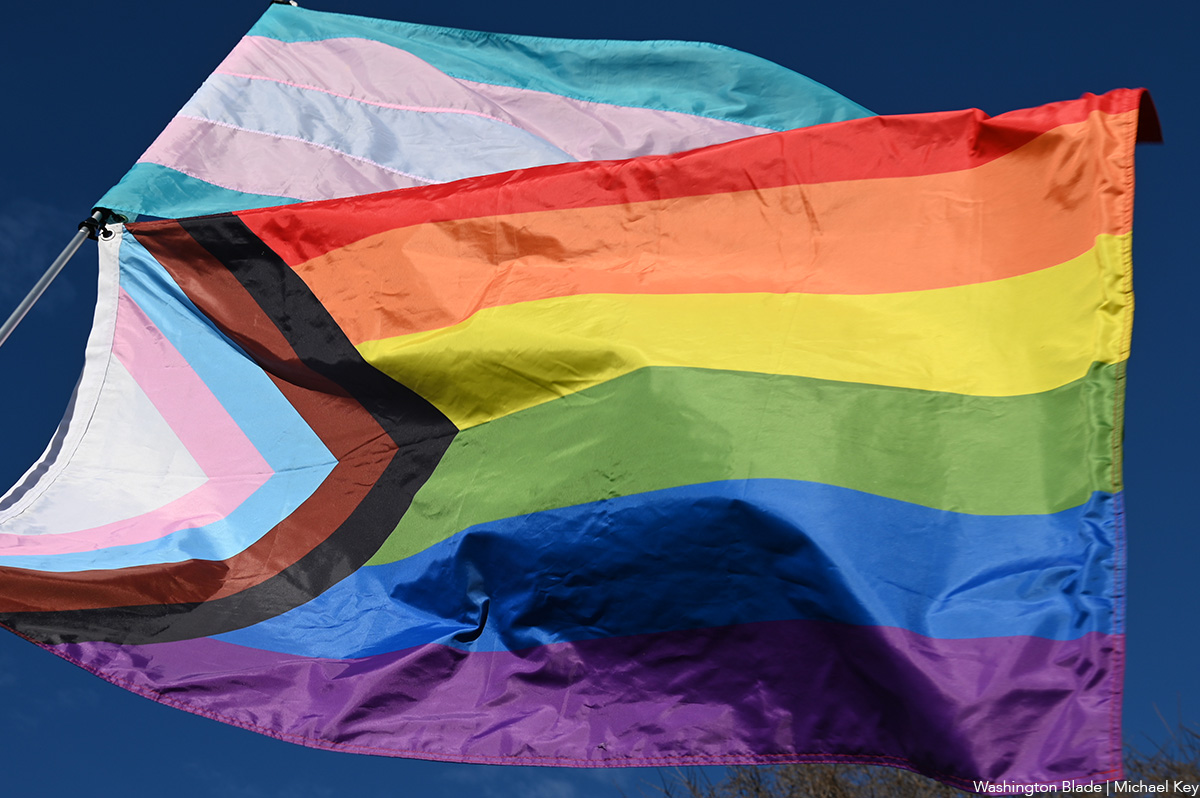
On Dec. 17th, the Williams Institute found that hate crimes targeting people based on their gender identity have more than tripled in California since 2013. The research center’s latest report on statewide gender identity hate crimes utilizes data reported to the California Department of Justice from 2001 to 2024, and outlines the increasing violence transgender and gender nonconforming people face.
Hate crimes motivated by gender identity and sexual orientation have made up 23% of all reported hate crimes in California since 2001, and nearly half of these incidents between 2013 and 2024 were reported in Los Angeles County alone. The study’s lead author, Jordan Grasso, points to several possible reasons for such high numbers in L.A., including the county’s overall population size, its large transgender community, and local law enforcement policies around identifying and reporting hate crimes.
It’s difficult to compare these numbers across counties, though, Grasso explained to the Blade, since practices like reporting, investigating, and recording incidents “are shaped at the local level and can vary widely from agency to agency.”
While these practices can vary, one overarching statewide shift occurred in 2013, when the California Department of Justice added “anti-gender nonconforming” as its own bias subcategory: one that was separate from “anti-transgender.” Since then, over 500 gender identity hate crimes targeting transgender and gender nonconforming people have been recorded in California.
This marked a step towards creating more nuance in the ways gender identity hate crimes are understood, reported, and responded to by law enforcement officials. Five years later, in 2018, California passed a law that required all law enforcement trainees to receive training on sexual orientation and gender identity.
“This matters because once someone reports a hate crime, officers who have a better understanding of these issues may be more likely to recognize the incident as a hate crime and record it as such, rather than treating it as a general offense,” Grasso wrote to the Blade.
As transgender and gender nonconforming people face increasing violence, they are also reporting lower levels of trust in police. They are more likely than cisgender people to experience discrimination, harassment, and bias when seeking help from law enforcement, which then discourages them from seeking help at all.
“There are clear gaps between transgender and nonbinary Californians’ experiences of violence and what shows up in official hate crime reports,” Grasso wrote. “These gaps are shaped in large part by longstanding and persistent negative interactions between LGBTQ people, especially transgender people, and law enforcement.”
Grasso found in another recent study that, while almost 60% of transgender and nonbinary survey respondents reported experiencing violence or harassment in the last year, their self-reported experiences may outnumber actual reported hate crimes. “This suggests that officially recognized hate crime reports capture only a small fraction of the violence and victimization that transgender and nonbinary people experience across the state,” they explained.
These gaps widen even more when considering transgender and gender nonconforming people who experience intersectional forms of hate. Transgender women, notably, face a disproportionate amount of violence and harassment, but current law enforcement recording policies around gender identity hate crimes can water these facts down.
Grasso explained that when law enforcement officers make hate crime reports, they are required to note a single “most serious bias,” a practice that aims to create one digestible explanation out of what are often very layered and complicated incidents of violence. “This has two consequences,” Grasso wrote. “First, gender identity hate crimes are likely undercounted, especially among people who are multiply marginalized. Second, patterns of victimization among people who are targeted for multiple, intersecting reasons—such as race and transgender identity—remain largely invisible.”
These limitations fuel new solutions, and several public policy recommendations are detailed in the report. Many of these suggestions urge improved data collection and access: namely, that law enforcement officials explain all applicable bias motivations in their hate crime reports to California’s Department of Justice. This way, researchers can better understand the scope and impact of those who are targeted by multiple biases.
The report’s authors are also supportive of the development of alternative options for reporting hate crimes because of the stigma and fear transgender and gender nonconforming people experience with law enforcement. Grasso points to CA vs. Hate, the California Civil Rights Department’s non-emergency resource and reporting hotline.
The local offshoot LA vs. Hate similarly provides a community-centered and non-law enforcement system that encourages Angelenos to report the hate crimes they experience and access various social services offered by grassroots organizations. This trust in community solutions also allows researchers to better comprehend and respond to increasing violence based on gender identity, as people are more willing to lean on these alternatives to share their stories.
Kristie Song is a California Local News Fellow placed with the Los Angeles Blade. The California Local News Fellowship is a state-funded initiative to support and strengthen local news reporting. Learn more about it at fellowships.journalism.berkeley.edu/cafellows.
California
Ricardo Lara, John Heilman inducted into Victory Institute’s Hall of Fame
Induction took place in D.C. on Saturday
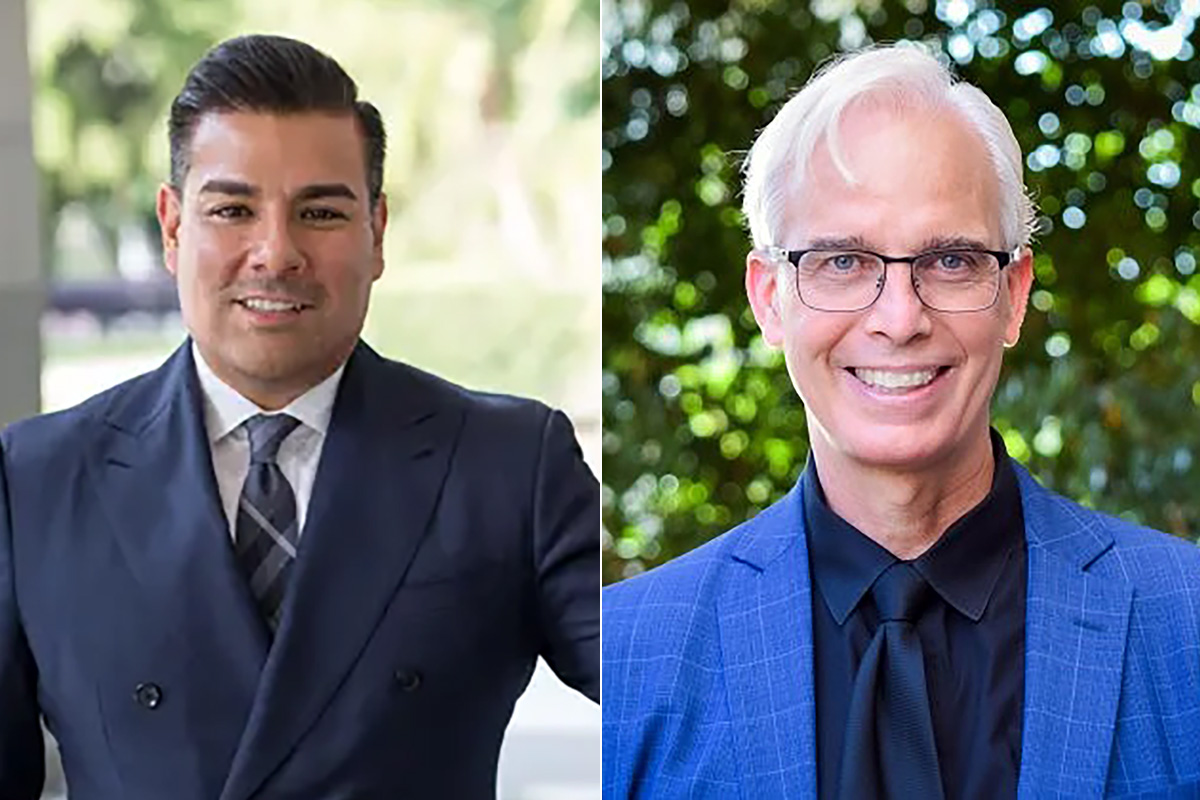
The LGBTQ+ Victory Institute on Saturday inducted California Insurance Commissioner Ricardo Lara and West Hollywood Vice Mayor John Heilman into its LGBTQ+ Political Hall of Fame.
The inductions took place during the Victory Institute’s annual International LGBTQ+ Leaders Conference in D.C.
U.S. Rep. Robert Garcia (D-Calif.), San Diego Mayor Todd Gloria, San Leandro Councilmember Victor Aguilar Jr., are among those who attended the conference. Evan Low, the LGBTQ+ Victory Institute’s president, served in the California State Assembly from 2014-2024.
Former state Senate President Pro Tempore Toni Atkins, former Assembly Speaker John Pérez, former state Sen. Christine Kehoe, former Palm Springs Mayor Ron Oden, Harvey Milk, a member of the San Francisco Board of Supervisors who was the state’s first openly gay elected official, and José Sarria, who ran for the San Francisco Board of Supervisors in 1961, have also been inducted.
California
Prop 50 has passed, with overwhelming support from local voters and LGBTQ+ advocates
Over 5 million Californians voted in support of the congressional redistricting measure.

Yesterday, on the night of the California statewide special election, polls closed at 8 pm for the vote on Proposition 50, the “Election Rigging Response Act.” The measure was created to combat Texas lawmakers’ plans to redraw their state’s congressional districts ahead of the November 3rd, 2026, midterm elections in order to secure more Republican seats in Congress.
A “yes” vote on Prop 50 would allow California to temporarily redraw its own congressional district maps beginning in 2026, according to the California Voter Information Guide. Since August, Democratic organizers and leaders have been advocating for the passage of the measure as a way to stand up to “cheating” that has been committed by other states.
Last night, over 8 million ballots were counted, and an overwhelming 63.8% of these were votes in favor of Prop 50. In Los Angeles County alone, nearly 2 million ballots were submitted, and 73% of voters sided with passing the measure.
Governor Gavin Newsom celebrated the victory as an act of resistance. “Instead of agonizing over the state of our nation, we organized in an unprecedented way,” he said, in a series of video statements posted online. “We stood tall and we stood firm in response to Donald Trump’s recklessness. And tonight, after poking the bear, this bear roared — with an unprecedented turnout in a special election with an extraordinary result.”
The results have also fueled impassioned LGBTQ+ leaders to keep the fight going, especially as federal legislation continues to put queer and trans communities at risk. “Donald Trump and MAGA Republicans have systematically targeted LGBTQ+ rights, rolling back nondiscrimination protections, erasing our history, and attacking transgender kids and their families,” said Tony Hoang, director of LGBTQ+ civil rights organization Equality California, in a press release. “With the passage of Proposition 50, Californians have sent a clear message: our votes will not be silenced, our voices will not be ignored, and our rights will not be rolled back during a rigged midterm election.”
Advocates have also stressed that Prop 50 sets a precedent in creating more ground in the ongoing battle for increased rights and protections for queer communities. “Tonight’s victory is critical in the fight to secure a pro-equality majority in Congress,” said Kelley Robinson, president of the Human Rights Campaign, another notable LGBTQ+ civil rights group. “This is a victory powered by communities that refuse to be silenced and are unwavering in their commitment to defending democracy.”
California
Newsom announces $140 million will go towards state’s Planned Parenthood centers
This investment supports the organization as it struggles with federal defunding
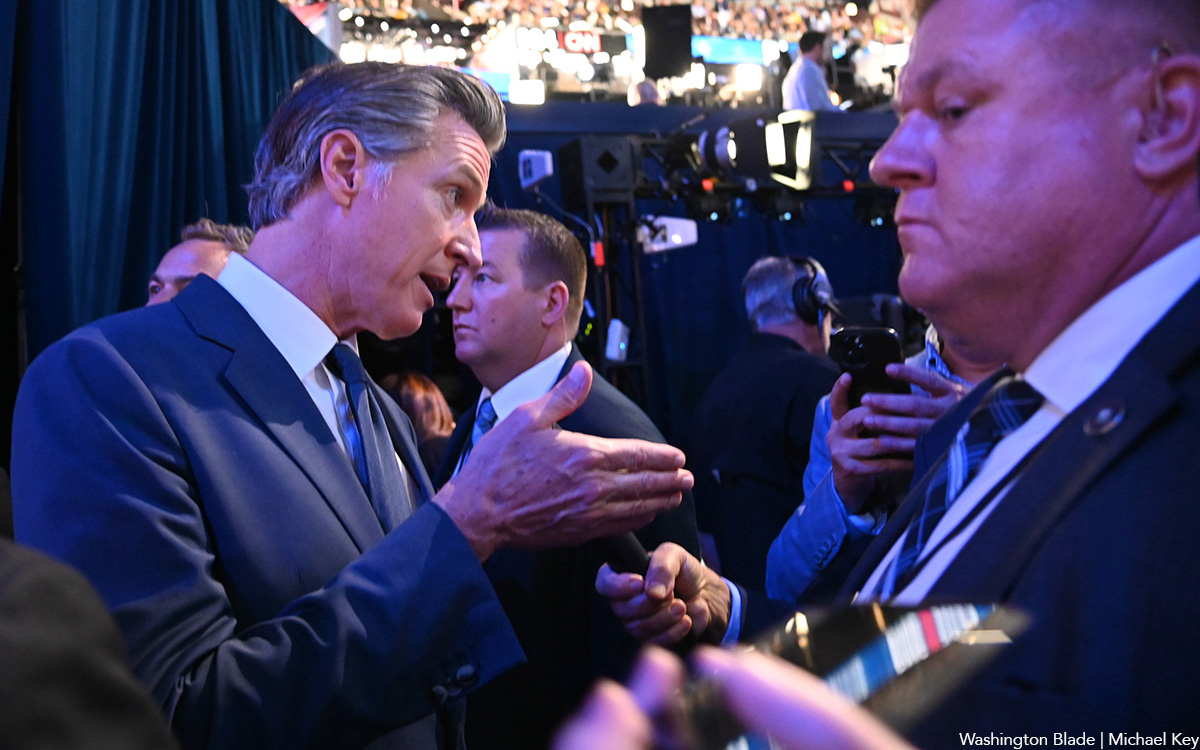
Yesterday, Governor Newsom stated in a press release that he is dedicating over $140 million to keep statewide Planned Parenthood health centers running through the rest of the year until additional resources are identified.
H.R. 1, also known as the “One Big Beautiful Bill Act,” was passed in July and includes detailed notes on the congressional budget, including cuts to various federal agencies and programs. In section 71113 of the bill, federal funding is restricted against “prohibited entities” that provide health services like abortions. Organizations like Planned Parenthood were also blocked from receiving federal reimbursement for providing essential care services to patients enrolled in Medicaid or Medi-Cal.
Planned Parenthood traces its roots to the early 1900s, where it began as a clinic providing birth control resources. Today, there are over 100 Planned Parenthood health centers across California alone, providing abortion services, STI testing and treatment, gender affirming care, birth control options, and other reproductive care services. It has been a lifeline for many in accessing affordable care and education around their reproductive and sexual health.
The effects of H.R. 1 have cut deeply into local communities. As reported by local advocates and government representatives, the neighboring Planned Parenthood of Orange and San Bernardino Counties (PPOSBC) had to eliminate a primary health care service line that provided over 10,000 patients direct access to services like cancer screenings, birth control, and prenatal care.
This recent investment by the state highlights California as a “reproductive freedom state,” Newsom said in a statement. “[This] latest investment continues to show our belief in protecting access to essential health care in times of distress.”
The governor’s next steps in this defense include working with other legislative leaders to identify more long-term solutions for 2026 that will allow Planned Parenthood clinics to continue operating. “While we know Trump and Republicans’ attacks on reproductive health care are escalating, we remain confident that our state leaders will continue to stand with Planned Parenthood patients and providers and ensure they have the support necessary to endure the persistent assaults,” said Planned Parenthood Affiliates of California president Jodi Hicks in a separate statement.
California
Governor Newsom has vetoed two bills aimed to improve PrEP and gender-affirming care access
An update on AB 554 and SB 418, as well as nine other LGBTQ+ bills that the governor passed earlier this week

This Monday, Governor Newsom issued a legislative update on over 150 bills that had passed legislation and were waiting on his decision on whether or not they would be chaptered into law. 11 of these bills advocated for queer community members, including their improved access to healthcare, more privacy rights, greater ease in changing their name and gender markers, as well as the expansion of adoption rights and the inclusion of two-spirit individuals into important funding and resource opportunities.
Two were vetoed.
AB 554: Greater access to HIV/AIDS preventative medicine (Vetoed)
First introduced in February, AB 554 was co-authored by local Assemblymember Mark González and San Francisco Assemblymember Matt Haney. Also known as the Protecting Rights, Expanding Prevention, and Advancing Reimbursement for Equity (PrEPARE) Act of 2025, the bill intended to expand patients’ access to various forms of FDA-approved HIV/AIDS preventative medication. It would have prohibited health insurance plans from subjecting these forms of medication to prior authorization, step therapy, or cost-sharing. It would have also required the state to reimburse local agencies for administering this medicine, alleviating the strain on small clinics to meet the demand of community members in need of PrEP.
Though LGBTQ+ civil rights groups like Equality California rallied support for the bill, it was returned by the governor without a signature. In a veto memo, he wrote that he “wholeheartedly [supports] efforts to ensure affordable and accessible prevention and treatment of HIV/AIDS” but questioned whether the bill would actually increase the affordability of and access to necessary preventative treatment. “By exceeding the cost-sharing provisions under the ACA [Affordable Care Act], this bill would result in increased costs to health plans, which would then be passed on to consumers.”
In response, Assemblymember González wrote to the Blade about his disappointment. Still, he remains hopeful about the state of PrEP access. “I’m deeply grateful to Governor Newsom for his continued partnership and for standing with us in protecting access to PrEP through this year’s budget.”
SB 418: Stronger access to gender-affirming care without discrimination (Vetoed)
Authored by Senator Caroline Menjivar, SB 418 would have required a health care service plan to cover up to a 12-month supply of FDA-approved prescription hormone therapy and the supplies needed by an individual to self-administer this medication without being subjected to utilization management methods like prior authorization.
The bill was also intended to prohibit health insurers from denying a patient the ability to enroll in or renew their health insurance plans based on factors like sex characteristics, intersex traits, and gender identity.
In late January, President Trump released a statement that the federal government would “not fund, sponsor, promote, assist, or support the so-called ‘transition’ of a child from one sex to another.” As healthcare for trans, gender-expansive, and intersex (TGI) individuals becomes increasingly unstable under the current administration, SB 418 aimed to protect TGI community members and their ability to access critical and necessary hormone therapy and gender-affirming care.
In the governor’s veto memo, he wrote that he was “concerned” about the bill’s limitation on utilization management methods. For him, it’s an “important tool [that ensured] enrollees receive the right care at the right time. Prohibiting this cost constraint strategy is likely to result in an increase in enrollee premiums to offset costs incurred by health plans and insurers.”
For Senator Menjivar, this decision was “heartbreaking” as TGI individuals continue to face barriers to vital care. “SB 418 was the most tangible and effective legislative tool introduced this year to help TGI folks weather this political storm,” Menjivar wrote to the Blade. Still, she says that she is committed to continue fighting to secure health care access for TGI community members.
The vetoing of these two bills was a major blow for LGBTQ+ civil rights organizations and advocates. Equality California executive director Tony Hoang wrote about his disappointment in a recent press release. “These bills would have guaranteed that transgender people and their families could continue to access essential medications without disruption and that people at risk of HIV could obtain PrEP quickly and affordably,” wrote Hoang. “The Governor’s decision to veto these measures undermines California’s longstanding leadership in advancing health equity and protecting the LGBTQ+ community.”
But with these setbacks came a number of wins. Governor Newsom passed nine other bills advancing the rights of LGBTQ+ individuals.
SB 59: Confidentiality protections for trans and nonbinary individuals
This bill, authored by Senator Scott Wiener, will ensure that when someone files a legal petition to change their name or their gender marker, these court records are kept confidential. Additionally, SB 59 will prohibit people other than the petitioner to post these confidential records online.
AB 678: Creating an LGBTQ+ inclusive council on homelessness
Created by Assemblymember Alex Lee, AB 678 will require the governor to build an Interagency Council on Homelessness that will form relationships between federal and state agencies with local, on-the-ground coalitions and nonprofit organizations that focus on working with unhoused communities. Together, they will work on creating strategies to end homelessness.
The bill also specifically requires this council to actively work with LGBTQ+ leaders and community members to ensure that the strategies it develops are inclusive and culturally competent.
AB 1525: Restricting disciplinary action against attorneys on the basis of “sensitive services,” which includes gender-affirming care
The California State Assembly’s Committee on Judiciary created this bill to prohibit disciplinary action against attorneys who receive, advocate for, recommend, or enable “sensitive services,” which include health care services for sexual and reproductive health, sexually transmitted illnesses, and gender-affirming care.
AB 1084: Streamlining court processes for name and gender marker changes
Created by Assemblymember Rick Zbur, AB 1084 aims to quicken the process and limit barriers transgender and nonbinary individuals face when filing to change their name and gender marker. The bill will require courts to issue orders within six weeks from when a petition is filed, and without a hearing. The bill will also prohibit others from being able to file an objection to a petitioner’s name or gender marker change.
SB 450: Protecting adoption rights for LGBTQ+ parents and families
Authored by Senator Menjivar, SB 450 will allow queer parents from other states to claim parentage rights to their adopted children born in California. “The signing of SB 450 is a win for LGBTQ+ parents who want what every parent wants, the protection of their legal rights as the parents of their children,” Senator Menjivar wrote to the Blade. “SB 450 clarifies California’s longstanding jurisdiction for adoption proceedings, including confirmatory adoptions, in cases where the families no longer live, or never lived, in the state but the child was born here. This means LGBTQ+ families, who are weighing the options of potentially leaving an affirming state to a Red state for financial reasons, can at least now feel confident that decision won’t cost them their parental rights.”
SB 497: Protecting right to gender-affirming care from out-of-state law enforcement
Authored by Senator Wiener, SB 497 is another bill focused on providing protections for transgender and nonbinary individuals. It will prohibit healthcare providers and service plans from releasing medical information related to gender-affirming care for a patient who is being pursued by out-of-state law enforcement officials. SB 497 would also generally safeguard against out-of-state subpoenas that would prevent a person’s ability to access gender-affirming care.
SB 590: Including chosen family members in paid family leave laws
Authored by Senator Maria Durazo, this bill would alter existing laws around paid family leave, which currently provides wage replacement benefits for up to eight weeks for workers who take time off work to take care of seriously ill family members. SB 590 will expand this definition of family members to include “designated” persons. For many queer individuals, their “chosen family” members are often just as crucial, if not more than, their blood relatives. This bill opens up the scope of what is considered a family member, allowing LGBTQ+ individuals wage protections if they take time away to care for these loved ones.
AB 1487: Expanding equity fund to include two-spirit communities
Co-authored by Assemblymembers Dawn Addis and Mark González, AB 1487 will rename the existing Transgender, Gender Nonconforming, and Intersex Wellness and Equity Fund to the Two-Spirit, Transgender, Gender Nonconforming, and Intersex (2TGI) Wellness and Equity Fund. This will enable the fund to grant financial support to organizations that serve two-spirit and LGBTQ+ tribal community members in a number of services, including: workforce development training, resettlement and social integration programs, youth outreach, healthcare support, and more.
AB 82: Confidentiality protections for patients and providers of reproductive and gender-affirming care
Authored by Assemblymember Chris Ward, this bill will allow reproductive or gender-affirming health care patients and service providers who face violence and harassment because of their association with such care to request that state and local agencies protect the confidentiality of their identities and addresses.
California
Congress members, public health organizations urge Governor Newsom to sign bill amidst threats to PrEP access
Two letters have been sent to the governor, calling on him to sign AB 554 into law by October 12th
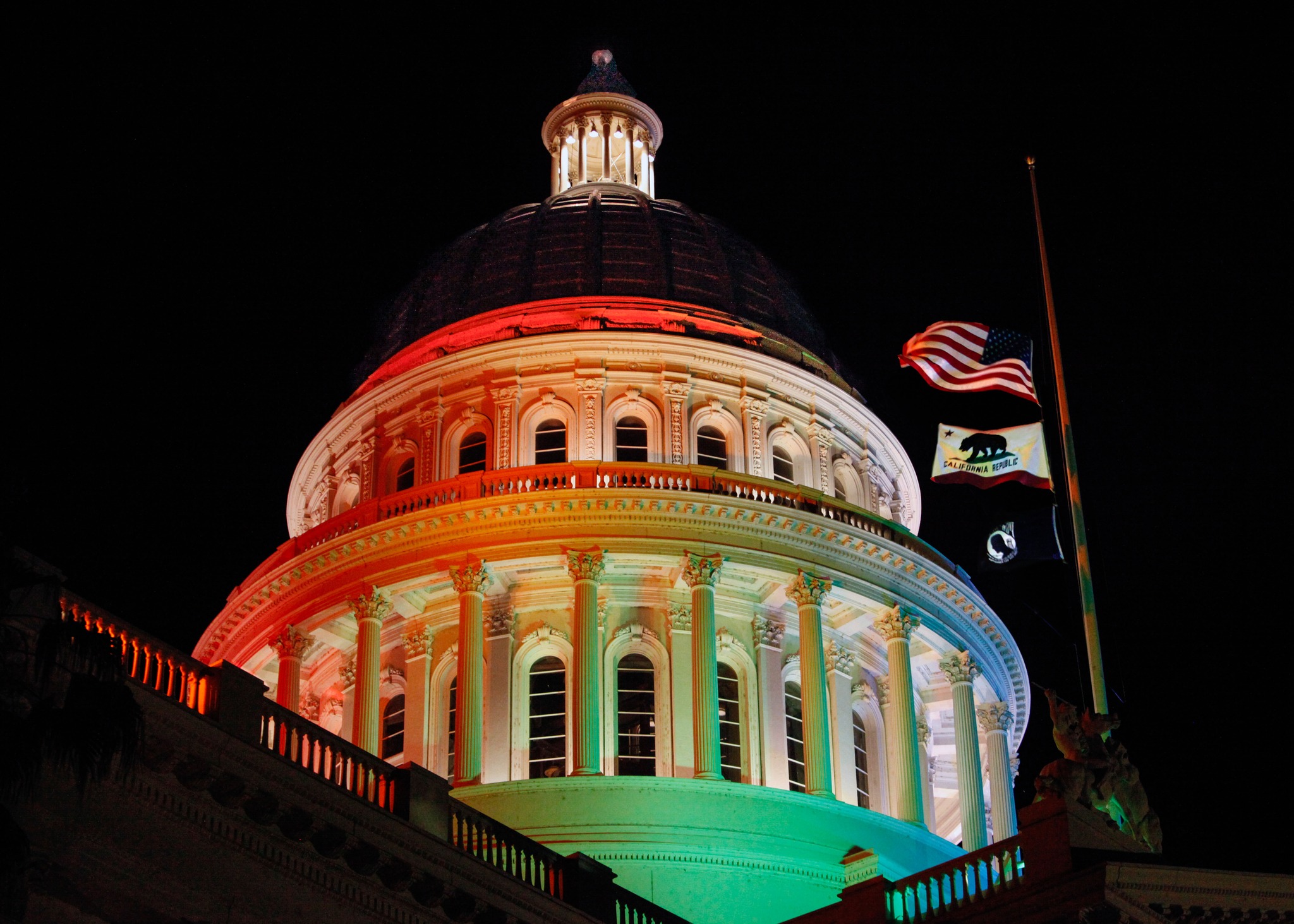
On September 24th, 13 Congress members penned a letter to the governor, asking him to sign AB 554 — or the PrEPARE Act of 2025 — into law. If passed, the bill would strengthen existing state laws around health insurance coverage and access to preventative medication for individuals affected by HIV/AIDS.
AB 554 would require health plans and insurers to cover all FDA-approved PrEP medications, including injectable forms, without prior authorization or step therapy. The bill’s co-authors and supporters emphasize the need to bolster support for impacted individuals and communities, ensuring that they can access effective treatment plans with as few systemic barriers as possible. The bill also includes protections for community clinics, so that they are reimbursed promptly and able to provide medication for impacted people.
In this letter, co-signed by local elected officials including District 42 Representative Robert Garcia, District 43 Representative Maxine Waters, and District 34 Representative Jimmy Gomez, the coalition of Congress members cites a number of reasons for this call to action.
Namely, they state that the Department of Health and Human Services Secretary Robert F. Kennedy, Jr.’s reported desire to oust all members of the U.S. Preventive Services Task Force — an independent panel of disease prevention experts that provides recommendations to insurance companies, doctors, and other health professionals — is a move that “risks reversing decades of progress in the fight against HIV, one of the most devastating epidemics in history.”
They also write in the letter that insurance cost-sharing restrictions are especially harmful towards Black and Latine communities, who “accounted for over 70% of new HIV diagnoses [in the state] yet remain significantly underrepresented among PrEP users compared to their White counterparts.”
In a separate letter addressed on September 25th, over 90 advocacy groups and public health organizations similarly stressed the importance of AB 554 to the governor. Here, they discussed CVS Health’s decision to not approve coverage for Yeztugo, the first twice-yearly injectable PrEP medication, even though it was approved by the FDA in June.
The organizations that have signed on include LGBTQ+ civil rights organization Equality California, as well as resource outreach groups such as the AIDS Healthcare Foundation and the California LGBTQ Health & Human Services Network. They write that CVS’s “dangerous decision underscores the urgent need for additional clarity in state law to ensure that all FDA-approved PrEP medications are covered without cost-sharing, guaranteeing that lifesaving innovations are available to Californians without delay.”
The letters highlight a need to address equity and accessibility for those impacted by HIV/AIDS, specifically those who belong to marginalized communities. AB 554 received a majority vote of support by both the California State Assembly and Senate on September 10th, and now waits in limbo for Governor Newsom’s signature. He has until October 12th to sign or veto the bill.
In the meantime, Equality California encourages community members to visit their website to learn more about the bill, other pending LGBTQ+ state legislation, and how they can support these movements.
California
Kamala Harris opts out of Governor’s race: What does that mean for 2028 and trans rights?
From her time in the courtroom to the Senate floor and the White House, Harris has built a career within the political system. But her latest message hints at a shift in strategy.

Vice President Kamala Harris announced today that she will not run for Governor of California in 2026, putting to rest long-standing speculation about her political future. In a public statement, Harris said she spent the past six months reflecting on “the best way for [her] to continue fighting for the American people and advancing the values and ideals [she holds] dear.”
From her time in the courtroom to the Senate floor and the White House, Harris has built a career within the political system. But her latest message hints at a shift in strategy.
“We must be willing to pursue change through new methods and fresh thinking,” she wrote, “committed to our same values and principles, but not bound by the same playbook.”
While stepping back from the governor’s race, Harris made it clear she’s not stepping away from politics. She plans to campaign for Democrats nationwide and suggested more details about her next chapter are on the horizon.
Her announcement comes at a time when the Democratic Party is facing urgent questions about whether it will fully defend trans lives amid rising attacks. California Governor Gavin Newsom recently called it “deeply unfair” for transgender athletes to participate in girls’ sports. Former Transportation Secretary Pete Buttigieg echoed the same framing, saying, “most reasonable people agree that it’s a serious fairness issue.” These are not harmless statements; they are capitulations to anti-trans narratives that frame our right to exist and participate as something debatable.
These statements from two of the party’s most visible figures aren’t outliers either; they reflect a broader trend of Democratic leaders hedging their language or pandering to the center instead of standing firmly for trans people’s dignity and rights. While Harris didn’t mention trans issues in her statement, her record is also mixed. She has caused harm in the past but has shown signs of growth, becoming more publicly supportive of trans rights in recent years. Still, symbolic gestures are no longer enough. The real question now is: what comes next?
As Harris, Newsom, and Buttigieg emerge as likely contenders for the 2028 Democratic presidential nomination, transgender Americans and our allies are paying close attention. We are tired of being treated as a liability, a distraction, or a political bargaining chip. We are not a wedge issue.
We are voters. We are organizers. We are human beings. And we deserve to know which of these potential leaders will truly fight for us, not just when it’s politically safe, but when it matters most.
Breaking News
Trump administration sues California over trans student-athletes
Lawsuit claims state policy violates federal law on school sports
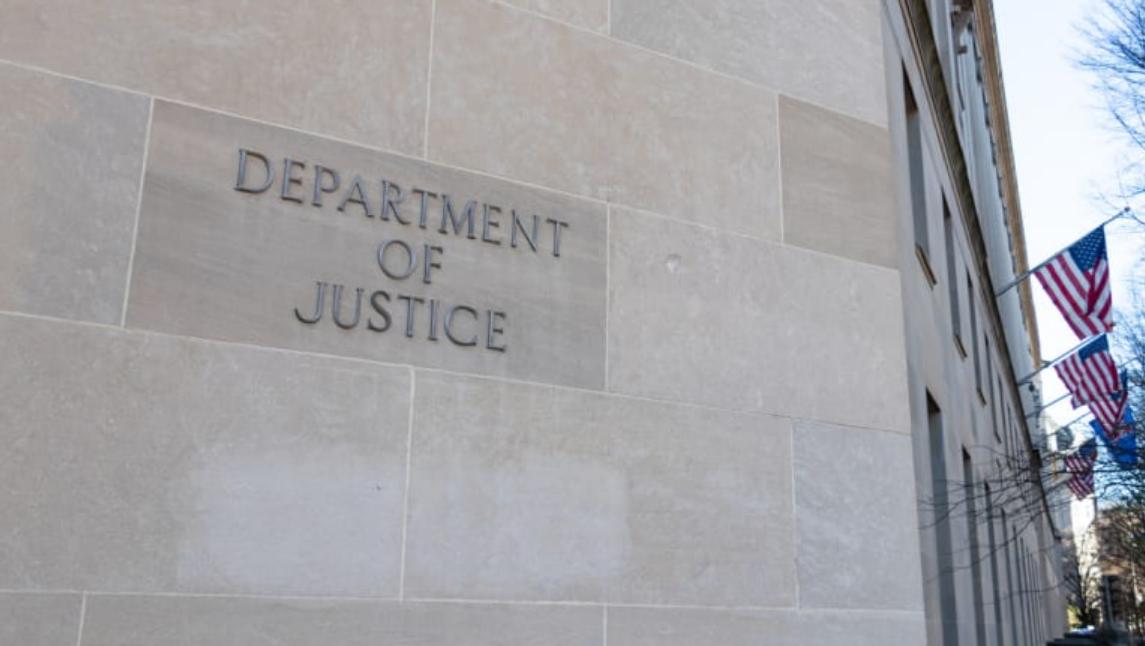
President Donald Trump is making good on his threat to punish California officials for allowing transgender female student-athletes to compete with cisgender girls in school sports.
On Wednesday, the U.S. Department of Justice announced it is suing the state’s Department of Education, claiming California’s policy to allow trans students to compete with other girls violates Title IX, the federal law that bans discrimination in education based on sex. The DOJ’s suit says California’s rules “are not only illegal and unfair but also demeaning, signaling to girls that their opportunities and achievements are secondary to accommodating boys.”
As the Washington Blade reported in June, this lawsuit follows a warning by the Trump administration to end the trans participation policy within 10 days or face referral to the DOJ as well as the loss of federal education funding.
And California may merely be the first to face legal action, according to U.S. Attorney General Pam Bondi, who warned that the 21 other states which permit trans girls to compete in female athletics could also face challenges by the federal government.
“If you do not comply, you’re next,” she said in a video posted on the DOJ website. “We will protect girls in girls sports.” Bondi was joined by Secretary of Education Linda McMahon.
The DOJ suit named California’s Education Department and the California Interscholastic Federation, the governing body for high school sports. A spokesperson for the CIF told the Associated Press the organization would not comment on pending litigation.
A spokesperson for Democratic Gov. Gavin Newsom deferred to the CIF and the Department of Education in declining to comment on the lawsuit since the governor was not named a defendant. But Newsom’s office told the AP that the Trump administration’s attacks on its policies protecting transgender athletes are “a cynical attempt” to distract from the federal government’s withholding of funds for all students who benefit from after-school and summer programs.
Newsom, however, has come under criticism — most notably by the Human Rights Campaign — for remarks he made in March, that allowing transgender athletes to compete in women’s sports was “deeply unfair,” as the Blade reported.
For more than a decade, California law has allowed students to participate in sex-segregated school programs, including on sports teams, and use bathrooms and other facilities that align with their gender identity.
But headlines about AB Hernandez, an out trans female high school student-athlete who won titles in the California track-and-field championships last month, drew condemnations from Assistant U.S. Attorney General Harmeet Dhillon, and President Trump himself.
Following the meet, Dhillon wrote in a letter to the California Interscholastic Federation that it violated the Equal Protection Clause of the Constitution by allowing trans girls to compete against other female athletes.
As for the lawsuit, DOJ claims California’s policies “ignore undeniable biological differences between boys and girls, in favor of an amorphous ’gender identity.’”
“The results of these illegal policies are stark: girls are displaced from podiums, denied awards, and miss out on critical visibility for college scholarships and recognition,” the suit says.
Last week, the U.S. Supreme Court agreed to hear two cases challenging state bans on trans student-athletes, as the Blade reported. More than 20 states have limited trans girls from participating on girls sports teams, barred gender-affirming surgeries for minors and required parents to be notified if a child changes their pronouns at school. More than two dozen states have laws barring trans women and girls from participating in certain sports competitions. Challenges to some of those policies are still being decided by courts across the country.
Back in February, the president signed an executive order that bans trans girls and women from participating in sports that match their gender identity, as the Blade reported.
Supporters of banning trans girls and women from competing include the conservative California Family Council, which has posted a petition online, arguing a ban would restore fairness in athletic competitions. Opponents like Equality California say bans are an attack on transgender youth.
“Local schools and athletic associations are the ones who should be handling these issues, and they are already creating policies that protect transgender youth and ensure a level playing field for all students. A federal ban that overrides those rules could require young girls to answer inappropriate personal questions or even be subjected to genital inspections by strangers if they want to participate in sports,” the organization said in a statement in February.
“The head of the NCAA, himself a former Republican Governor, recently told a U.S. Senate panel that he knew of less than 10 out transgender athletes among the 510,000 currently competing in college sports—less than .002 percent of all NCAA athletes.
“Studies confirm that participation in sports provides kids with invaluable life skills such as teamwork, leadership, discipline, and cooperation—fundamental lessons that every young person deserves the chance to experience. Beyond the field, sports also contribute significantly to students’ overall well-being, fostering better mental health, boosting academic performance, and enhancing self-esteem and confidence.”
California
Williams Institute reports impact of deportations on LGBTQ immigrants
Latest report suggests transgender, nonbinary and intersex immigrants face significantly higher safety risks
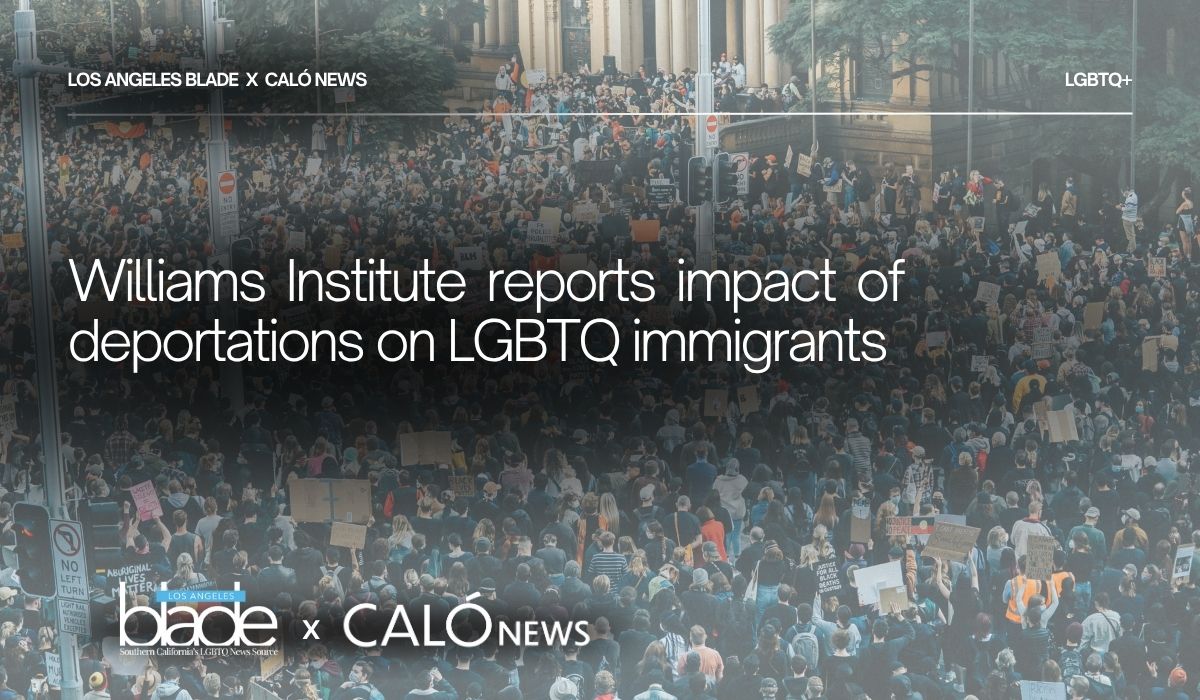
Williams Institute at UCLA has released its latest report, highlighting the intersection between LGBTQ and immigration issues and the impact of the U.S. Customs and Immigration Enforcement (ICE) raids across Los Angeles on LGBTQ people.
According to the brief, LGBTQ immigrants who hold legal status, but who are not naturalized citizens may also face challenges to their legal right to reside in the U.S.
Recent reports indicate that non-citizens with legal status are being swept up in immigration operations and several forms of legal status which were granted at the end of the Biden administration are being revoked. Those include: Temporary Protected Status (TPS) for some Venezuelan immigrants, as well as those from Afghanistan and Cameroon, while Haitian nationals are now facing shortened protection periods, by up to six months.
The Justice Department has proposed a new rule which grants the government border authority to revoke green card holders’ permanent residency status at any time. This rule is currently under review by the Third Circuit Court of Appeals, which could significantly affect non-citizens who are currently documented to reside in the county legally.
Supervisorial District 1, under Supervisor Hilda L. Solis, and Supervisorial District 2, under Supervisor Holly J. Mitchell would particularly be affected as it contains the city center of Los Angeles and nearly 29,000 LGBTQ, noncitizens would face the harshest impact. Those two districts contain many of the county’s historically Black, Latin American and Asian, Pacific Islander neighborhoods.
For transgender, nonbinary and intersex immigrants arrested or detained by ICE, there are additional impacts regarding how federal law defines biological sex and gender identity. The Trump administration has signed an executive order which redefines “sex” under federal law to exclude TGI individuals. This adds an extra thick layer of possible violence when TGI individuals are placed in detention centers or in holding that does not correspond to their identity.
According to the report, ‘transgender, non-binary, and intersex immigrants must navigate an
immigration and asylum system without information about how federal agents will respond to their gender identity and with the risk of greater violence if placed in detention centers, given the effects of this executive order.’
The brief estimates the number or foreign-born adults in Los Angeles County who will be potentially affected by the Trump administration’s executive orders on mass deportations.
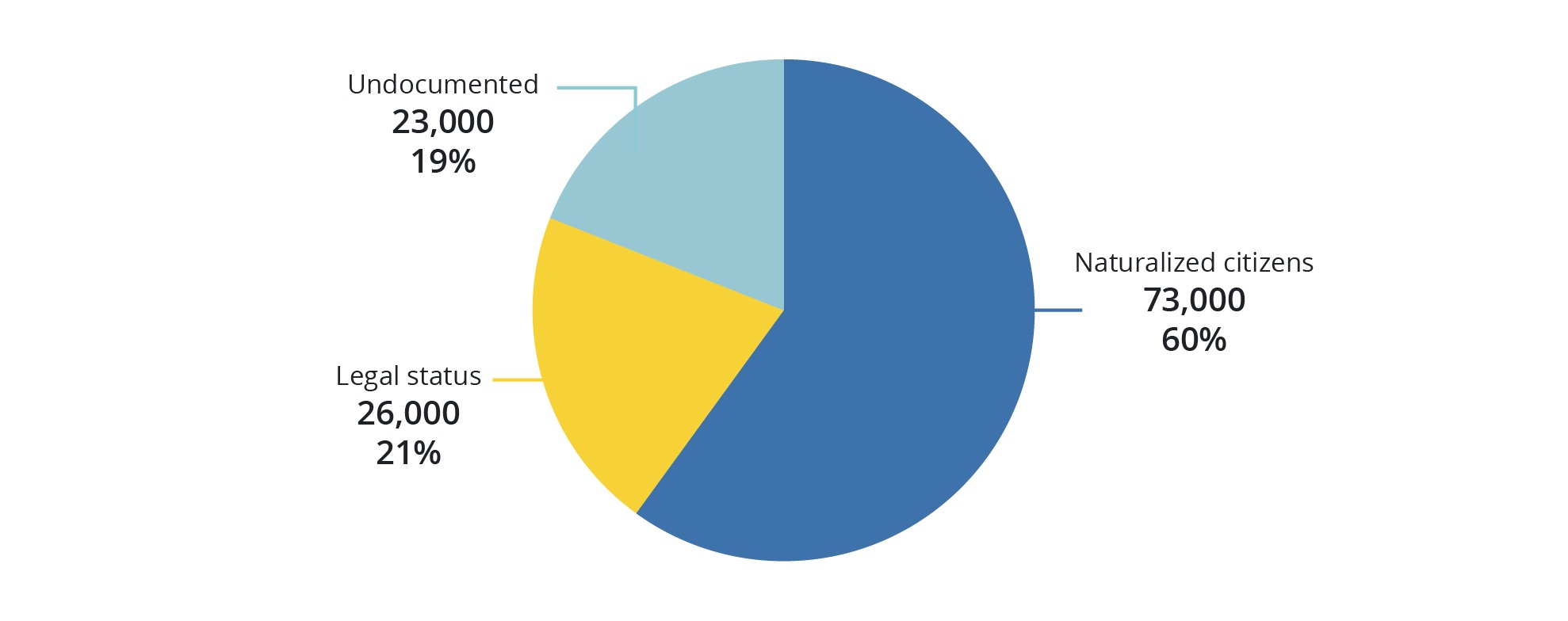
Graphic courtesy of Williams Institute at UCLA.
Using previous data from other Williams Institute Studies and reports from the University of Southern California Dornsife Equity Research Institute and data from the Pew Research Center, the latest brief states that there are over 1.35 million LGBTQ-identifying people across the U.S., with 30% of them residing in California.
The report further points to 122,000 LGBTQ immigrants who reside within LA County specifically, making Los Angeles County home to about 10% of all LGBTQ adult immigrants in the U.S.
While 18% of those Angelenos are foreign-born, only around 7%, or 49,000 of them do not hold legal status.
Using research from the Pew Center and applying an estimate, that means that there are approximately 23,000 undocumented LGBTQ across LA County and the remaining 26,000 LGBTQ immigrants in the county have some form of legal status.
Among the LGBTQ population of adult immigrants in California, approximately 41,000 are transgender or nonbinary. That figure also points toward approximately 5,200 of them residing in LA County. According to the proportions applied for this estimate, the Williams Institute approximates that around 3,100 transgender and nonbinary immigrants in LA County are naturalized citizens, over 1,100 have legal status and just under 1,000 are undocumented.
According to a brief released in February by the Williams Institute, ‘mass deportations could impact 288,000 LGBTQ undocumented immigrants across the U.S.
-

 Books2 days ago
Books2 days agoZoë Rose Bryant on her chart-topping debut novel ‘Good Friends’ and inspiring young trans people online
-

 Los Angeles2 days ago
Los Angeles2 days agoNikko LaMere’s photo exhibit “JOY!” documents the euphoria of Black queer nightlife
-
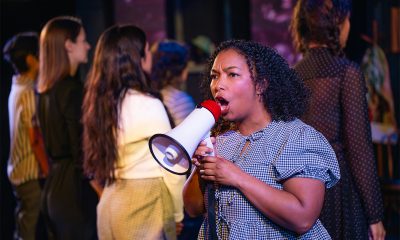
 Reviews4 days ago
Reviews4 days ago“The June Jordan Experience” captures the late queer poet’s tender, revolutionary legacy
-

 Viewpoint2 days ago
Viewpoint2 days agoGay acceptance in US takes a dangerous reversal
-

 Commentary3 days ago
Commentary3 days agoValentine’s Day, Alone
-

 Commentary2 days ago
Commentary2 days agoPost-Valentine’s Day: Are your standards protecting you — or keeping you single?
-

 National2 days ago
National2 days agoLGBTQ+ activists mourn the Rev. Jesse Jackson
-

 Movies21 hours ago
Movies21 hours agoEva Victor winning best screenplay, Erin Doherty winning supporting actress, and more queer highlights of the 2026 Film Independent Spirit Awards

